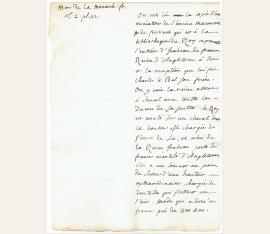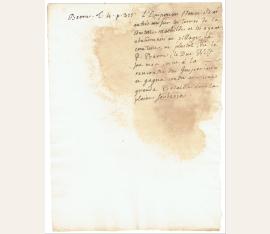philosopher (1712-1778). 2 autograph manuscripts. No place, ca. 1745 to 1750. 2½ pp. and 6 pp. in-4 (255 x 190 mm) written on the right side of the sheets with unrelated title page "Extraits de L'Antiquité expliquée". In brown linen case.
12.500 €
(79894)
Excerpts from three books pointing to Rousseau's time as the private secretary to the famous salonnière Louise Marie Madeleine Fontaine, called Madame Dupin (1706–1799). 1) Excerpt of a manuscript on the life of Isabella de Valois, Queen of England by Jean Froissart printed in Bernard de Montfaucon's "Monuments de la monarchie française" (1729) and from Charles Baunier's "Recueil historique, chronologique et topographique des abbayes de France" (1729) concerning the reception of a bishop by the abbess of Notre Dame aux Nonnaines in Troyes.
2) Excerpt from "The life of Pope Sixtus the fifth" by the protestant historian Grégorio Leti with examples of Sixtus' harsh punishments in cases related to the honor of women. – When Jean-Jacques Rousseau was introduced to Madame Dupin in 1743 he was immediately drawn to the salonnière who was famed for her beauty, wit and intelligence. Although the infatuated Rousseau had to be discouraged from making unrequested advances to her, Madame Dupin employed the young philosopher as her private secretary and tutor for her son Jacques-Armand in 1745. During his employment Rousseau was mainly occupied with research for Madame Dupin's magisterial work "On the equality of men and women" and the transcription of her dictation. The excerpts at hand were part of Madame Dupin's highly ambitious project. The manuscript of this pioneering text on women's rights comprises almost 2000 pages organized in 47 chapters but was never to be published. Despite an often difficult relationship with Madame Dupin, Rousseau remained on friendly terms with the family after his discharge in 1751 and received some financial support later on. In his posthumously published "Confessions", he prizes Madame Dupin's charme and beauty. Concerning the question of the role of women in society and women's rights Rosseau held contrarian views to his employer as laid down in "Émile, ou De l'éducation" and other important works..
philosopher (1712-1778). Autograph manuscript. 4to. 1/2 p. Stained.
1.800 €
(89522)
Reading note taken from l'Histoire de l'Allemagne du père Joseph Barre (1748), volume 4, p. 325, as stated by Rousseau, who wrote this note at the time of the publication of Barre's book, while he was working with his patron Madame Dupin on a work On the Equality of Men and Women, which was never published. This note relates to the 11th century. „L'Empereur Henri étant entré sur les terres de la Comtesse Mathilde et les ayant abandonnées au pillage, la comtesse, ou plus tôt, dit le P. Barre, le Duc Welf son mari, vint à la rencontre des Imperiaux et gagna contre eux une grande bataille dans la plaine Sorbaria“.
philosopher (1712-1778). Eigenhändiges Musikmanuskript. ohne Ort und Datum. Quer-Folio. 2 pp.
12.500 €
(91816)
Niederschrift in Rousseaus Hand von einer Komposition von Johann Chrstian Bach (1772) aus der Oper Temistocle auf ein Libretto von Pietro Metastasio „Nulla risolvo nulla risolva e perdo e perdo il padre in tanto“.



